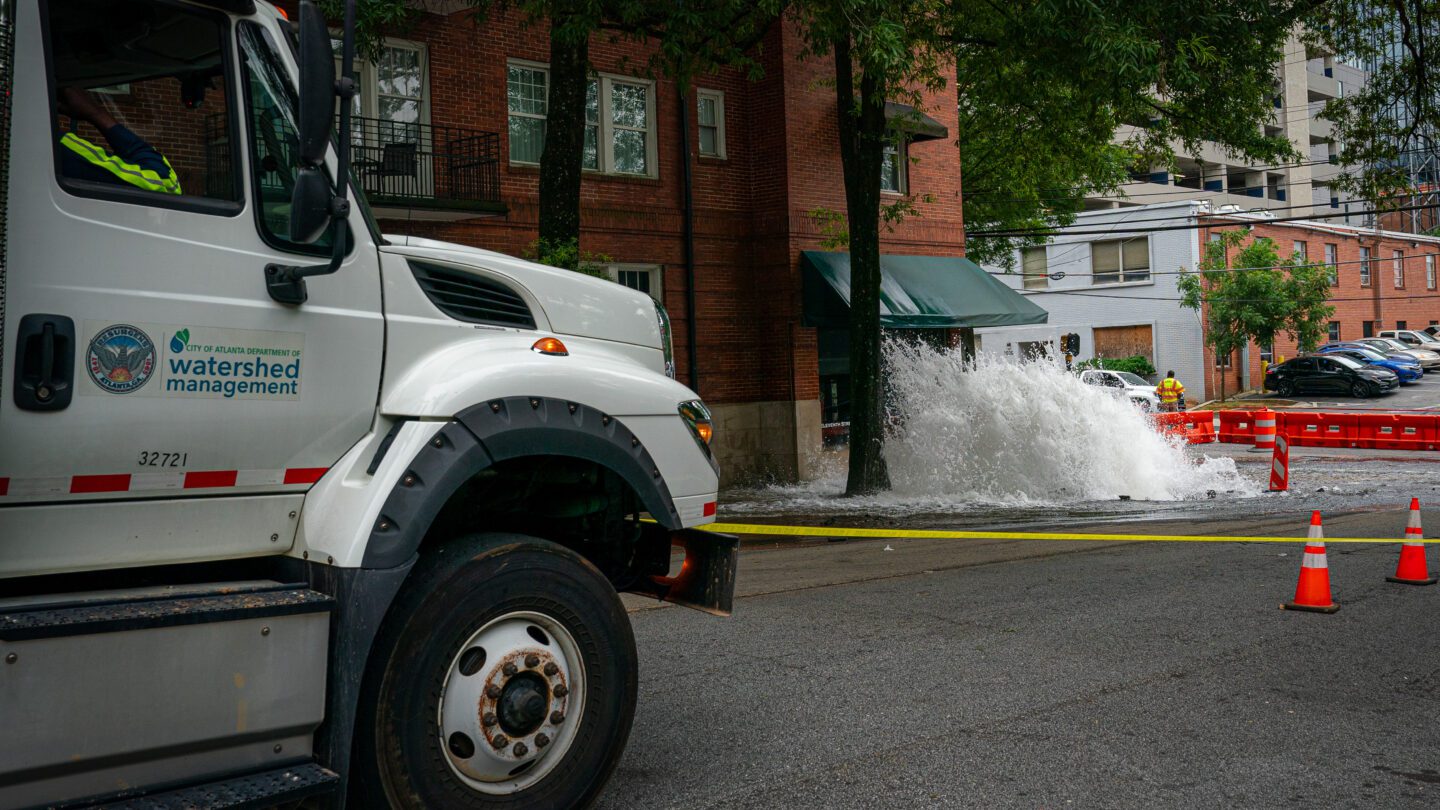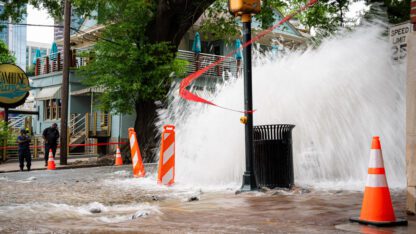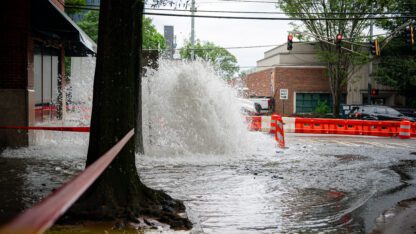As for lifting the boil water advisory, Wiggins said it comes down to stabilizing water pressure and testing the water to make sure it is safe.
Mayor Andre Dickens told council he’s requested help from the U.S. Army Corps of Engineers.
“They will be here with boots on the ground tomorrow to help us,” he said. “We have sought their assistance because they are the government entity that have the most actual experience in these types of crisis that we are in with crumbling and aging infrastructure.”
Dickens also announced legislation is in the works to set up a program to help businesses affected by the water outage.
Earlier in the day, Dickens said the city is “laser focused” on the water issues, as outages, low pressure and boil water advisories affecting large areas of the city drag into a fourth day.
“To all of our citizens, we wanted to apologize for the weekend that had a lot of folks having to boil water and a lot of challenges throughout the weekend related to these water main breaks,” Dickens said at a press conference at the site of one of those water main breaks Monday morning.
“I know that we did not have the weekend that Atlantans had planned to have,” he said. “Our main priority is to restore water service to all residents and businesses.”
The press conference ended abruptly after Midtown residents began shouting questions at the city’s watershed commissioner, and the mayor, who’s faced criticism over his response to the water problems, signaled to end it.
Meanwhile, Atlantans continued to deal with the impacts of the emergency.
Trinket Lewis, co-founder of MoreLyfe Juice, came to City Hall Monday to share how her juice bar in Southwest Atlanta had been affected.
“I have to send people home,” Lewis said. “From a financial standpoint, I’m working. I’m not paying myself, right, I’m just there to keep the business open. So if someone does come, you know, I’m able to service them, but in addition to that I’m having to go out and find ice. Everybody needed water.”
Lewis said she lost about 60% of her business over a three-day period.
Residents navigated low water pressure – or no water at all – on Friday. Issues with low pressure and the warning to boil water for drinking, cooking and tooth brushing continued to complicate people’s lives through the weekend and into Monday.
“We actually went and stayed in a hotel Friday night,” said Grant Park resident Brittany Peck, who was picking up water from a fire station Monday morning. “We have two kids, so we got some showers and it’s just been a struggle to get water so it’s great the fire station is giving water out for free.”
Six Atlanta fire stations are distributing water: Station 1 at 71 Elliot St., Station 2 at 1568 Jonesboro Rd., Station 10 at 447 Boulevard, Station 11 at 165 16th St., Station 15 at 170 10th St., Station 16 at 1048 Joseph E Boone Blvd.
Georgia Tech student Drew Peljovich said the problems have made him pay more attention to “the little things you don’t think about.”
“I am so used to coming back, pouring myself a glass of ice water, taking a shower,” he said. “Now I just have to put some extra steps. Get some water bottles. I can’t have any ice right now.”
According to the city, one major water main break at the corner of Brawley Drive and Boone Boulevard was repaired by Saturday evening. Another, at 11th Street and West Peachtree Street, is undergoing repairs now.
Over the weekend, the mayor issued a state of emergency for the city to allow for faster purchasing and hiring.
Both breaks came with their own complications, according to city officials. The Brawley and Boone break was at a place where three water transmission lines meet. The infrastructure and design were 80 years old, according to Department of Watershed Management Commissioner Al Wiggins.
The 11th and West Peachtree break caused a water geyser, which was difficult to tackle due to the valve to turn off water to the area being directly under the geyser, Wiggins said. He also said that once they figured out a different way to cut off water, repairs could proceed.
At the Monday morning press conference, Wiggins said his agency has not yet been able to do a full inspection of the 11th and West Peachtree break, but as of now, he said he did not believe the two major breaks were connected.
That goes for other, smaller breaks around the city as well – including one at 1190 Atlantic Drive and another at Euclid and North avenues – Dickens said. According to the mayor, both of those breaks were “routine, normal breaks.”
The city experienced more than 500 breaks and leaks in the past 12 months, according to a spokesman for the city.
Questions for Atlanta officials
City council members prepared to question city officials on their response to the outages at a Monday city council meeting.
“A lot of my questions are going to be around the communication piece,” said councilmember Liliana Bakhtiari. “I’m also going to have a lot of questions around what our long-term plan is in terms of investments.”
Councilmember Liliana Bakhtiari
Council president Doug Shipman said he plans to ask what the city is doing regarding audits to the system.
“Obviously, things break,” Shipman said. “But are we investing enough? And are we undertaking proactive ways in which understand where our weak points are and perhaps through maintenance can avoid these kinds of situations?”
Community activists also came to city hall, prepared to call for a $5 million emergency fund. Activists are hoping for up to $10,000 for small businesses with under 50 employees and up to $25,000 for businesses with 51 to 250 employees.
Public safety impacts
Atlanta’s justice system is largely back up and running after water main breaks.
The Fulton County courthouse re-opened Monday and is running normally, except for its water fountains.
A spokesperson for the Fulton County Sheriff’s Office said bottled water was brought into the Rice Street jail for its almost 1,600 residents when the boil water advisory was imposed. The facility was never without water nor did the pressure drop, according to the spokesperson.
According to the Atlanta Department of Watershed Management, crews completed enough repairs that service was restored to the Fulton County Jail and Atlanta City Detention Center by Sunday morning. A spokesperson for the detention center did not respond to a request for comment.
Boil water advisory continues
According to the Georgia Environmental Protection Division (EPD), boil water advisories stay in place during repairs because the loss of pressure in the pipes could allow bacteria from the soil or groundwater to enter the pipes.
Even once the repairs are complete, the boil water advisory stays in effect until the city flushes the system, restores pressure and takes water quality samples to check for bacteria and sufficient chlorination.
“The public water system can also rescind or modify a Boil Water Advisory without EPD approval, provided specific conditions are met,” representatives from the EPD wrote in an email to WABE. “The public water system does need to share sample results with EPD and notify EPD that the Boil Water Advisory has been lifted.”
An official with the EPD said the agency was first notified of the main breaks around noon on Friday, May 31.
Rahul Bali, Chamian Cruz, Marisa Mecke, Molly Samuel and Julien Virgin contributed to this report.









